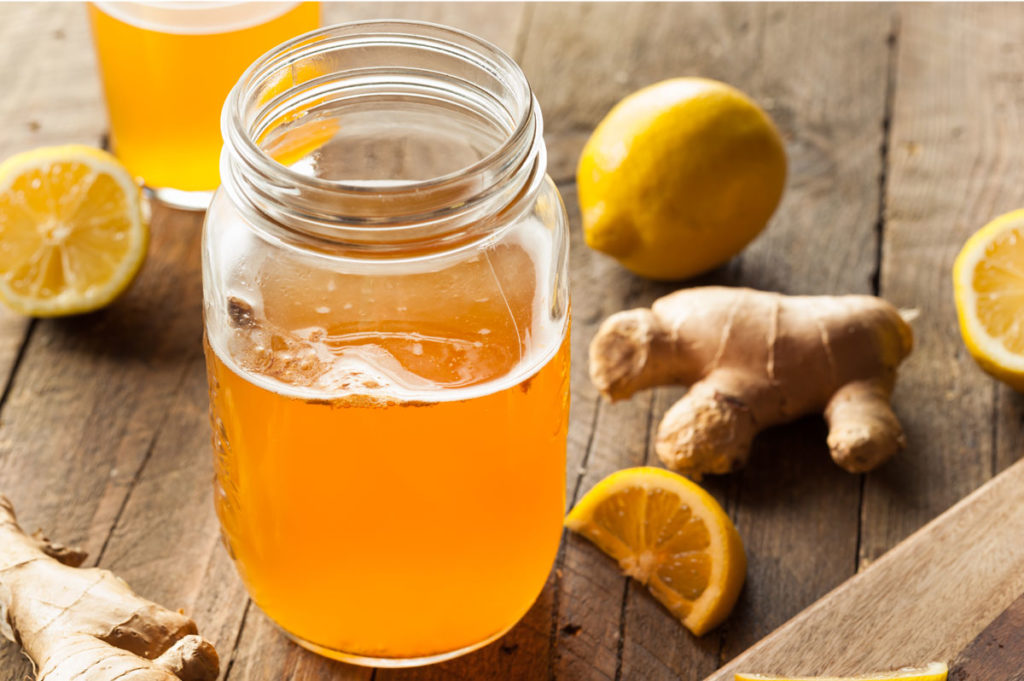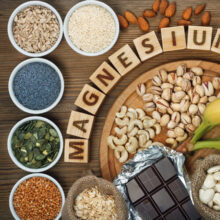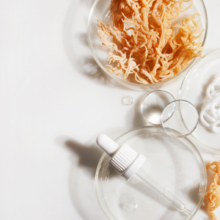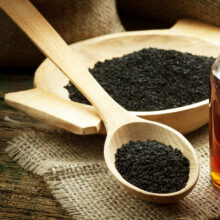Kombucha: Why Is There So Much Buzz?
- Published: Wednesday, July 12th 2017
- in Nutrition

Chinese people have been swigging kombucha tea (pronounced kom-bu-cha) for about 2,000 years, and proponents say it has health benefits ranging from improved digestion and liver function to pain reduction. Made with tea, sugar, bacteria and yeast, kombucha is a colony of bacteria and yeast. The tea is made by adding the colony to sugar and tea and then allowing it to ferment, resulting in a carbonated beverage containing vinegar, B vitamins, enzymes, probiotics, and acids.[1]
What’s it all about?
The bacteria and yeast colony that transforms the sweetened tea into kombucha is called a scoby (symbiotic culture of bacteria and yeast), which can be purchased online. Kombucha is typically made with black teas, although green tea can be used, and sweetened with cane sugar or honey. It can be made at home, if the conditions are very sterile, or purchased in bottles at grocery or health food stores.
Most kombucha is raw and organic. Kombucha also contains caffeine and small amounts of alcohol from being fermented.[2]
Beneficial or dicey?
To answer this question, we looked to Dr. Josh Axe, a certified doctor of natural medicine, doctor of chiropractic and clinical nutritionist, and Brent A. Bauer, M.D. at the Mayo Clinic in Minnesota.
Dr. Axe is a proponent of using food as medicine and believes kombucha has many health benefits, such as improved digestion, weight loss, increased energy, cleansing, and detoxification, immune support, reduced joint pain and cancer prevention.[3]
However, Dr. Bauer writes that while there are many fans of kombucha tea, there’s no scientific evidence to support health claims. He notes that people can experience adverse effects, such as stomach upset and allergic reactions and cautions against brewing your own kombucha under non-sterile conditions.[4]
Dr. Axe also points out that people who have compromised immune systems should stay away from kombucha, as there could be harmful bacteria in the brew. And if you are “bucha” newbie, he suggests starting with small amounts to see if you have a negative reaction.
The beauty of kombucha
Kombucha is known for improving digestion but it is also a popular ingredient in beauty products and said to be a tonic for healthy skin. Fans say it is an antioxidant, thanks to the tea, and that the yeast has skin-firming properties. The sugar content also works as a skin brightener. Marketers at emerginC, a company that sells organic beauty products, claim that kombucha can detoxify, hydrate, improve the tone and clarity of your skin and help maintain moisture and elasticity. It’s also a popular ingredient in skin masks, another beauty trend that shows no signs of slowing down. Andalou Natural’s Kombucha Enzyme Exfoliating Mask is sold at Wal-Mart stores for under $12.
Eating the “bouch”
People usually drink kombucha, often several times a day, but it can be used in fresh sauces and vinaigrettes. You can substitute kombucha for vinegar in just about any salad dressing but boiling or freezing will kill the probiotic.[5] It also makes a probiotic-packed addition to fruit or green smoothies (try a ¾ cup of kombucha blended with a cup of strawberries and a banana). And if you’d like to try some bouch in your cocktails, check out these cocktail recipes from Bon Appétit®.
[1] MayoClinic.org, “What is kombucha tea? Does it have any health benefits?” Brent A. Bauer. M.D.
[2] Livestrong.com, “What is Organic Raw Kombucha?” Lauren Saglimbene, June 2015
[3] Draxe.com, “7 Reasons to Drink Kombucha Every Day”
[4] MayoClinic.org, “What is kombucha tea? Does it have any health benefits?” Brent A. Bauer. M.D.
[5] Blog.Krrb.com, “How to Cook with Kombucha”



